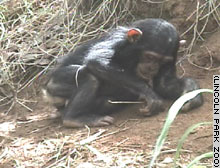Chimp youngsters a lot like humansFemales learn much faster while males romp aroundBy Marsha Walton |
(CNN) -- Check out a day care center or ask parents raising boys and girls: Many will say little boys and little girls learn and do things differently.
 Now there is scientific evidence suggesting our evolutionary cousins, chimpanzees,
exhibit gender-specific learning experiences.
Now there is scientific evidence suggesting our evolutionary cousins, chimpanzees,
exhibit gender-specific learning experiences.
A study of a primate behavior called "termite fishing" by a community of chimpanzees in Tanzania found that young females picked up the food-gathering technique much faster than males. Both sexes ultimately mastered the skill by the time they reached 5-and-a-half years old.
"Female chimps that we studied tended to learn the skill about 27 months earlier than male chimps," said Elizabeth Lonsdorf, a primate expert at Chicago's Lincoln Park Zoo. "Little girl chimps at the termite mound, even at very young ages, tended to watch their mothers more and pay close attention, while little boy chimps were off kind of playing around in the trees and doing somersaults," she said.
Chimps fish for termites by selecting a stick to probe the tunnel of a termite mound. The clever primates then pull out the stick for a tasty, high protein snack. That technique has been observed continuously in Tanzania's Gombe National Park since Jane Goodall first began her work there in 1960.
"Termites are a small part of their diet, but a highly valued part," said Lonsdorf. "Termites are sort of like 'chimp bon-bons,' they go crazy for them."
Lonsdorf and her colleagues spent four years studying termite fishing at the chimp community in Tanzania. The study involved animals as young as 3 months and as old as 11 years. The researchers ruled out that different treatment from their mothers affected how the youngsters learned.
"We found that mothers showed no differential behavior toward their sons versus their daughters. They weren't being nasty to their sons or encouraging to their daughters," said Lonsdorf.
The differences in learning may have an impact on what they do later as adults.
The boy chimps, who spend more time climbing, playing and roughhousing as youngsters, do more hunting than females as adults.
So the time spent doing "guy stuff" as toddlers may pay off by helping them develop those hunting skills, Lonsdorf explained. Teachers of young children see some parallels to the way human toddlers approach learning.
"Boys at this age tend to be a little bit more playful, and the girls tend to be a little bit more grown up acting, and more responsible," said Tomi Hall, a kindergarten teacher at The New Century School in Atlanta, Georgia. "I can call on the girls a lot of times to do things that I know they will carry through and do, whereas sometimes I have to follow the boys around so they do what I've asked them to do."
Lonsdorf often gives public presentations to share her experiences. She said a lot of parents can relate to her study.
"A lot of them just laugh and say, 'I've got a boy and a girl, and what you describe in the chimps is exactly what I see in my kids,'" she said.
Observers say it is important to remember that there is no right or wrong way to learn, whether it's how to fish for termites or how to read, write and do arithmetic.
"Each gender may be innately better at certain tasks, but that doesn't mean that they aren't capable of trying any task," said Lonsdorf.
The Lincoln Park Zoo will soon open a new great ape exhibit, and a termite mound will be a part of it. At the Tanzania park, strict rules prohibit interaction between chimps and human researchers. But in Chicago, Lonsdorf said she'll be able to come up with some experiments to learn more about chimpanzees and their behavior.
Lonsdorf's research in the journal "Nature" suggests these gender-based learning differences may go back to the last common ancestor of humans and chimpanzees. And she said learning experiences are not the only things humans and chimps have in common: Both know how to have fun.
"The chimpanzees play 'airplane,'" she said. "They lie down and put the kid on their feet and fly them around, just like humans do."
The young chimps also like poking, tickling and having a great time.
"Sure seems like humans and chimps are part of the same big family," she said.